After writing and reading up about all the Indian sweets for this entry, I think my poor blog is now suffering from the ultimate Sugar High! I started my last post talking about the savoury part of my Sunday, here's the sweet and toothaching part.
Besides serving savoury dishes, Lotus Family Restaurants also have a wide variety of Indian/Punjabi sweets and crispies like muruku and etc. I have tried to identify these sweets based on some websites and from discussions with the people from Lotus. I hope I got it right as I am no expert on Indian sweets but if not, do drop me a comment and I will amend the posting if it's wrong. The sweet counter display is right in front of the shop so you're lured to these jewel like sweets from the main road of Jalan Gasing. Usually these sweets are for festivals but occasionally people buy them for snacks or dessert.
This stack consists of glistening bright orange Jalebi. These sweet crispy round whirls are made from maida (Indian for plain flour), besan (Indian for gram flour) and water. The batter is deep fried in ghee (Indian for clarified butter) then dipped in a sticky sugary syrup. You can either infuse the syrup with some saffron threads to get a subtle colour. If you want to achieve this brilliant orange, you will need to add a few drops of red and yellow colouring.
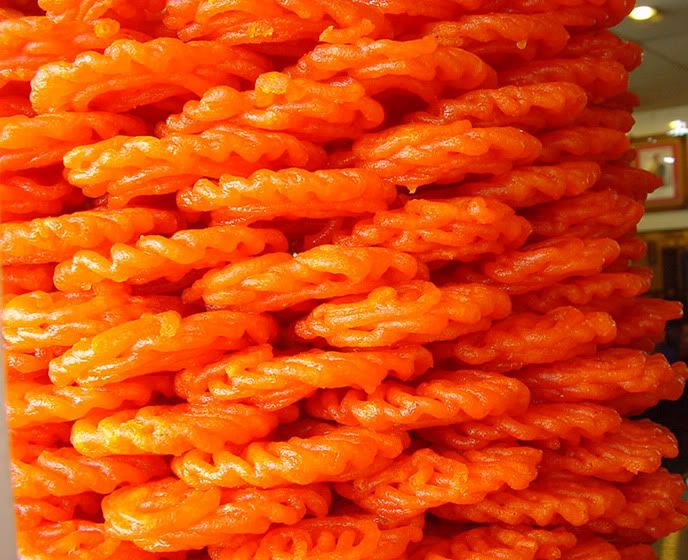
These powdery light brown balls are known as Ghee Balls. It's usually made from finely grinded roasted cashewnuts, flour, ghee and sugar. Pop one ball into your mouth for that melt in the mouth sensation. The Malays have a similar dessert that is usually served during their Hari Raya celebrations called Kuih Makmur that is made from roasted peanuts.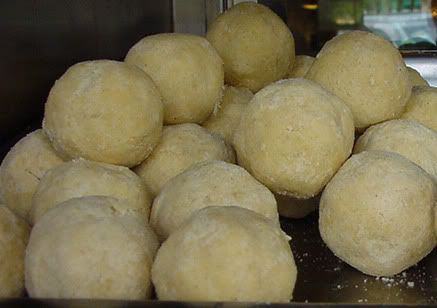
This balls are known as Gulab Jamun, another popular Indian dessert. Made from milk and flour, these balls are fried in ghee and served with a syrup flavoured with cardamon seeds and saffron.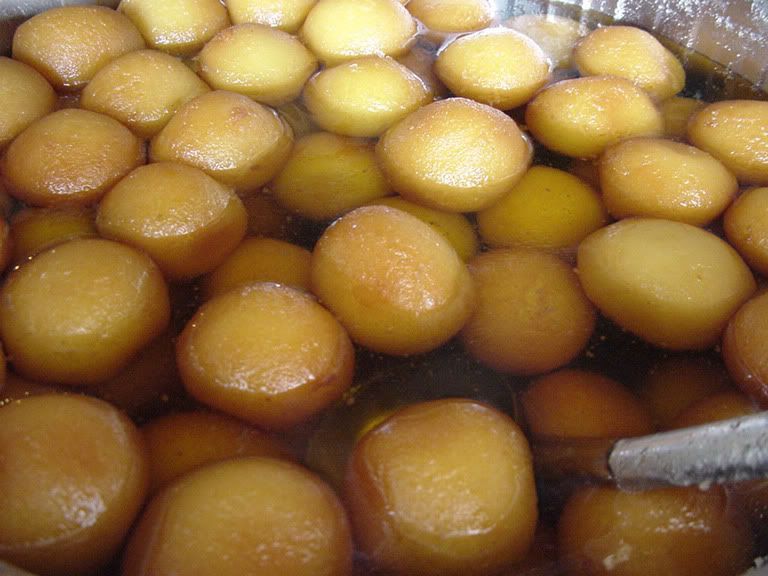
The next dessert is laddu that is usually made from gram flour, rice flour, sugar, ghee and cashewnuts. It's a popular dessert for Deepavalli when sweets are usually served in the hope that the year ahead will be sweet and happy. Traditionally the Indians will start making the sweets for the festive season after the Navarathiri, a nine-day fasting, which takes place exactly twenty eight days before the festival. Usually they will start on the tenth day as it is an auspicious time to start making the sweets.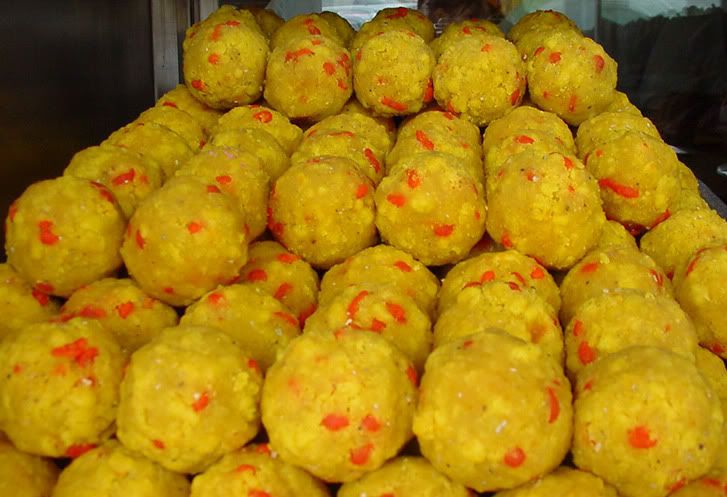
According to Lotus, this is Paalgova/Paal kova which is made from evaporated milk and sugar. This milk is slowly boiled until it is thickens then poured into a mould. Once cooled, you can cut them into shapes. The texture is crumbly and totally melt in the mouth.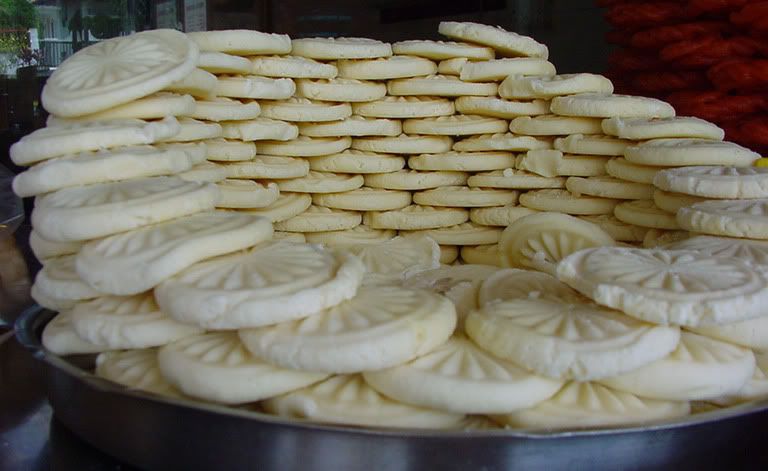
This is Halwa made with bits of almond, cardamon, sugar and milk. Ghee is also added into it and you can colour it with saffron or orange colouring.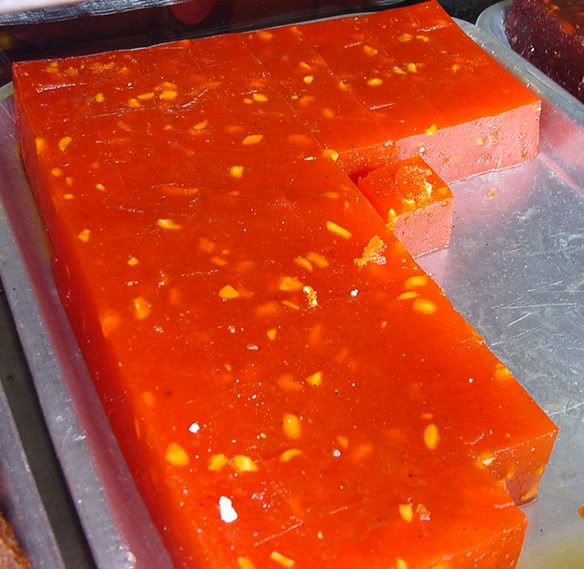
There are different varieties of halwa, this one uses dark brown sugar and cashew nuts.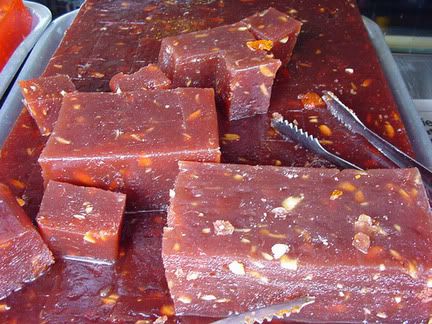
The plastic containers on the left is Khoya Barfi, a fudge like dessert made from khoya. Khoya is usually made at home by boiling and reducing the milk to a solid state. The biscuits on the right are made of sugee or semolina flour. I usually get the Khoya Barfi, one of my favourites and surprisingly my cat, Kits loves them! Guess it's not strange since it is made from milk and cats are supposed to love milk.
This is Lotus' coconut candy, all pretty in pink. These candies are usually made from evaporated milk, condensed milk and freshly grated coconut. You can add different colourings and flavourings when making your own at home. Usually they make pink, green, plain vanilla or chocolate ones.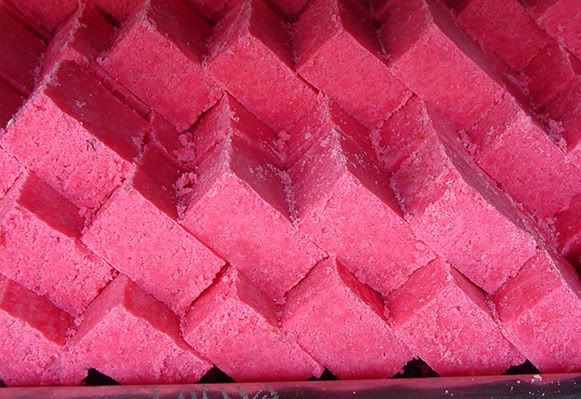
These are all the different kinds of Barfi they serve at Lotus. You can make them out of any ingredients including vegetables! The one below is just a plain milk one. Sometimes for festivals, they will decorate them with silver foil.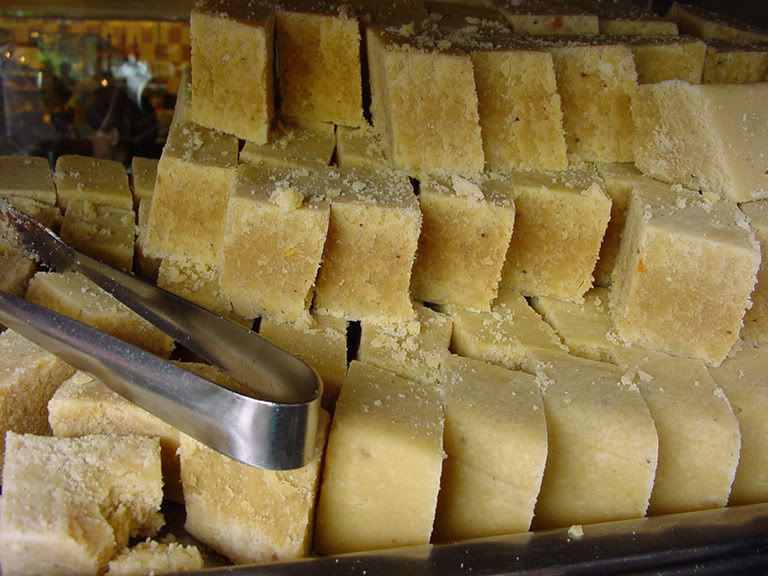
This barfi is made from cocoa powder and chocolate bits inside it.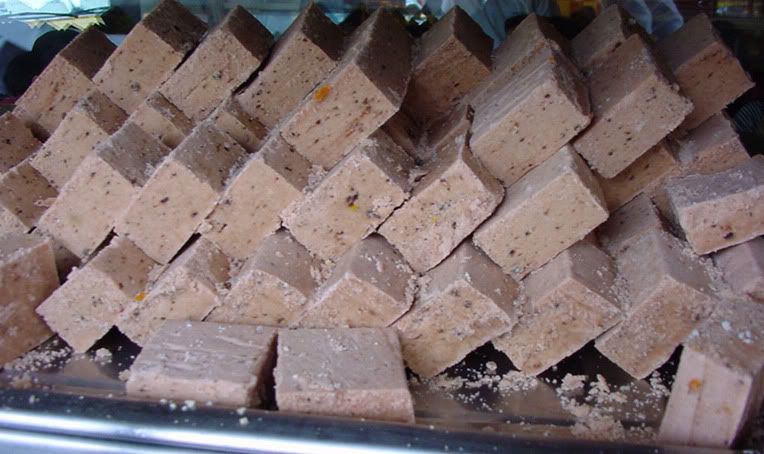
This is barfi studded with some dried fruits. Don't they look pretty with those red and green bits peeking out from that creamy fudge like dessert.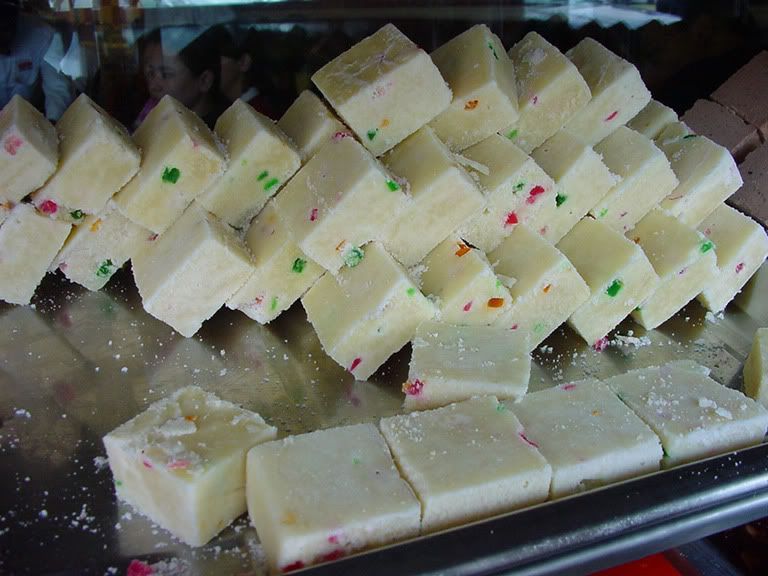
I love the way they stack up these sweets, reminds me of building Lego! This is plain barfi dusted with crunchy caster sugar.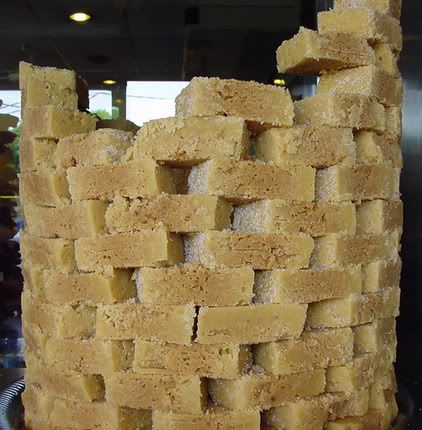
I am not sure what's the Indian name for this but Lotus told me that this doughnut like sweet is made from brown sugar.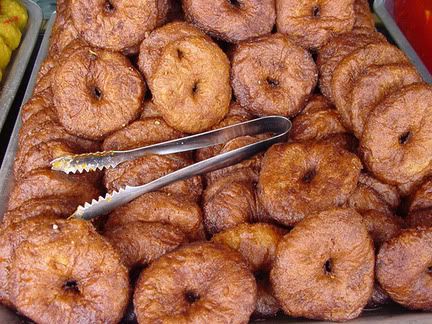
Besides sweets, Lotus also sells a variety of Muruku and crispies. Will probably blog about that another day once I get someone to explain to me the different varieties.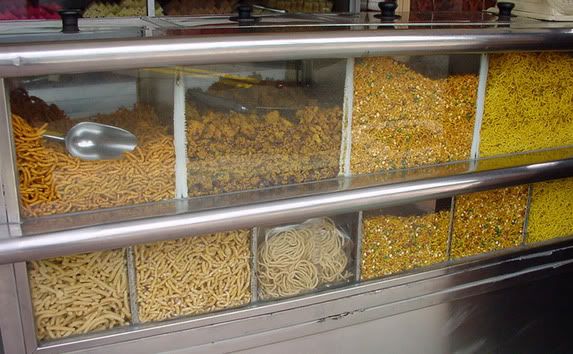
wow, where's this place exactly?
ReplyDeletejust discovered your excellent blog today and will be digging into your archive soon.
come cook for me.
ReplyDeleteYay!
ReplyDeleteYum yum yum yum! Thanks so much for all the indian sweets!!!!
I want hmmm ALL OF THEM! mmmmmmm
amy - Glad that you enjoyed this entry. I had total fun researching the sweets.
ReplyDeleteq - this is at the shophouses after the Assunta school turn off. Lotus told me they only have sweets in 2 outlets: this one and their other place in Lebuh Ampang. Dig ahead through the archives and have fun.
KY - Welcome to my blog. No need to cook for you, can see from your blog that you're an expert already.
Clare - Yeah, the entry started because you said you wanted to see what sweets we have. Now I think I am hooked as I am dying to find out more about all those crunchy stuff.
*grin* I thought so! Thanks so much I cant wait to here more about your increasing tooth aches ;)
ReplyDeleteI must say that I never had a thing for Indian sweets as I had always found them too sweet for me in the past BUT your extremely interesting pictures of great stacks of balls and squares of sugar and flour might just change my mind and lead me into Little India, in Singapore...hmmm
ReplyDeleteclare - at least those savoury crunchies look like less toothache.
ReplyDeleteCath - I was lucky to get great pictures as they had the stall outside. Make sure you blog about your visit to Little India.
boo,
ReplyDeleteWah!!!! This post so sinfull!! Indian sweets are really.....SWEET!!! But cant stop but indulge every once in a while la...heheehhehe
Love the coconut candy and the ghee balls.
Cheers,
-Makan Kings-
Barbara - Thanks for the head up on gulab jamun.
ReplyDeleteMakan King - Once in a while eat should be okay.
Wow, never seen so many Indian sweets at one place on cyberspace before. And you even know the name! Fantastic. I had seen them around but dare not touch most of them because of the strong spices smell. Can't stomach sugar and spice togeter. Used to smell curry only.
ReplyDeleteLilian, the amazing thing is all those sweets are crammed in one cupboard too at that shop. I asked the Lotus people the names and they were so sweet to tell me.
ReplyDeleteSome of them don't have spices, try the milky ones like barfi. Must be okay since my cat loves them too.
You are making me crave for all those things I am missing here...
ReplyDeleteSend some over lah...
shagen - Send some over to you? I wonder if NZ allow food to be sent over. I will check with my other foodie friends. If yes, I don't mind sending you some just to make you happy.
ReplyDeleteHi,
ReplyDeleteThe one which you don't know the name is Adirasam. Nice pictures.
cheers
rajani
I thought the khoya burfis (the ones on the left) looked a lot like stuff I know as Paal Gova. Aren't Paal Govas usually squarish and a bit brown?
ReplyDeletePaal gova tastes like condensed milk (susu pekat). I have to say it's the most delicious Indian sweet I've tasted. I haven't tasted much, but it's better than gulab jamuns, I can assure you.
A pity not many Malaysians know about Indian sweets. Thank God for my half-Mamak heritage ^_^
agendas
ReplyDeletecalendarios 2012
agendas 2012
Hydroxycut
calendarios
calendarios personalizados
Nitro-Tech
dipticos
buzoneo
mailing
flyers
folletos
imprenta online
impresion
tripticos
hoteles en el pais vasco
Animal Cuts
centro especial de empleo
NO Xplode
imprenta
Toothache is caused by an irritated nerve root. The most common causes of toothache are decay, loss of tooth, infection or an injury. As a result of the pain and inflammation on the tooth, you will also be experiencing pain in the jaw and face. Some people don't know what a toothache is like until they experience one.
ReplyDeletePerimine